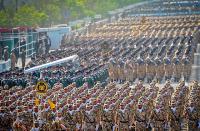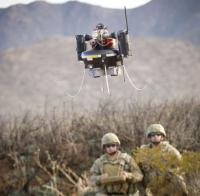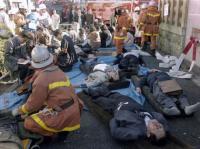-
Pressure mounts to keep human control over killer robots
Fully autonomous weapons would go a step beyond existing remote-controlled drones as they would be able to select and engage targets without human intervention. Although these weapons do not exist yet, the rapid movement of technology from human “in-the-loop” weapons systems toward “out-of-the-loop” systems is attracting international attention and concern. Countries should retain meaningful human control over weapons systems and ban fully autonomous weapons, also known as “killer robots,” Human Rights Watch and the Harvard Law School International Human Rights Clinic said in a new report. The concept of meaningful human control will be a centerpiece of deliberations at a week-long multilateral meeting on the weapons, opening 11 April 2016, at the United Nations in Geneva.
-
-
Sea Hunter, world’s first robot warship
At the Pentagon nowadays, you are starting to see robots everywhere. They dispose of bombs, and throw out the occasional first pitch. They help Marines improve their target shooting. And, if they are human-robot teams that entered last year’s DARPA Robotic Challenged Finals, they drive vehicles, use tools, open doors, climb stairs, and do all sorts of other things. Now another robot — one designed and built by the Defense Advanced Research Projects Agency (DARPA) — happens to be the very first robot warship.
-
-
Four questions Belgians should ask about the Patriot Act

The Paris and Brussels terrorist attacks added a sense of urgency to calls for Belgium to enact its own counterterrorism bill. It is a call the French government has already answered. Increased use of surveillance is a worldwide trend. There is no guarantee, however, that even with the most sophisticated surveillance technology out there today, passing a bill or law to collect private information on citizens will protect us from terrorist threats and violence. Even more vexing: the nature of intelligence gathering means we may never know exactly how many attacks have been prevented by the Patriot Act, the French surveillance law — or a similar law that Belgium may soon pass.
-
-
U.S. more likely to use force in a military dispute when the president is a Southerner
The United States is more likely to use force in a military dispute when the president is a Southerner, according to a new study. The study argues that “Southern honor” — an ethical code that emphasizes a reputation for resolve — pervasively shapes Southern presidents’ approach to disputes with other nations, making those presidents less willing than their peers from northern states to back down during international disputes. Consequently, Southern presidents have been more likely to use military force, resist withdrawal, and ultimately achieve victory, the study finds.
-
-
Historic preservation often neglected in disaster plans
Many communities fail to take historic preservation into account when planning for natural disasters, risking a loss of heritage and critical engines of the local economy in the event of catastrophe. Thousands of historic sites are left exposed to risk from floods and storms. “A lot of cultural and historic resources worldwide are at risk when natural hazards strike,” said the author of a recent study. “And even though we know this, very few resources are dedicated to protecting them.”
-
-
What is a dirty bomb and how dangerous is it?
The worrying news that individuals affiliated with the so-called Islamic State have undertaken hostile surveillance at a Belgian nuclear research facility has created growing speculation about the group’s nuclear ambitions. There are no indications that a terrorist group has obtained any fissile material to date. An easier option for a terrorist group would be to build a dirty bomb or, technically, a radiological dispersal device. This is the reason for sensible concern, rather than hysterical speculation about Islamic State’s recent activities in Belgium and, especially, Iraq and Syria. After all, without an effective government, it is unclear who controls the many radioactive sources in the region.
-
-
Tougher steel could be used for body armor, shields for satellites

A team of engineers has developed and tested a type of steel with a record-breaking ability to withstand an impact without deforming permanently. The new steel alloy could be used in a wide range of applications, from drill bits, to body armor for soldiers, to meteor-resistant casings for satellites.
-
-
Rising world military spending in 2015

World military expenditure totaled almost $1.7 trillion in 2015, an increase of 1 percent in real terms from 2014. The increase reflects continuing growth in Asia and Oceania, Central and Eastern Europe, and some Middle Eastern states. The decline in spending in the West is also levelling off. At the same time, spending decreased in Africa, and Latin America and the Caribbean. Thus, the global military expenditure picture is mixed. The United States remained by far the world’s biggest spender in 2015, despite its expenditure falling by 2.4 per cent to $596 billion.
-
-
African parliaments lead the continent's fight against weapons of mass destruction
Jihadist literature has, for a while, called for the acquisition of weapons of mass destruction — encouraging the production of ricin, botulinum, and sarin. The surge in terrorist acts and violent extremism on the continent should underscore, for all African states, the urgent need to actively prevent the proliferation of weapons of mass destruction to non-state actors. It also confirms the relevance of UN Security Council resolution 1540
-
-
ISIS planning to use drones for radioactive attacks on Western cities

Prime Minister David Cameron warned that ISIS terrorists are planning to use drones to spray nuclear material over Western cities in a lethal “dirty bomb” attack. Security experts are worried about jihadists buying simple drones, which are widely available, and use them to carry radioactive material into the centers of large cities in attacks which would kill thousands and contaminate large sections of cities, making entire areas uninhabitable for years.
-
-
ISIS rocket expert killed in U.S. strike
Jasim Khadijah, a former Iraqi officer in Saddam Hussein’s army who joined ISIS and led the organization’s rocket development effort, was killed by a drone strike in northern Iraq Sunday. Khadijah was responsible for a rocket attack last month on a U.S. military base near the town of Makhmour, located between Mosul and Kirkuk. That attack killed marine staff sergeant Louis Cardin and wounded eight others.
-
-
Sandia to help California in emergency response planning, training
Sandia National Laboratories and the California Fire and Rescue Training Authority (CFRTA) this month signed a memorandum of agreement to develop new concepts and capabilities for emergency planning, exercise and response. The agreement provides a framework of cooperation in a variety of vital areas of emergency response planning and training at the California Exercise Simulation Center (CESC) in Mather. The CESC is an exercise and research facility operated by the CFRTA that helps prepare first responders and incident commanders by simulating catastrophic and complex emergency scenarios at low cost.
-
-
Do gun-restriction laws help reduce gun deaths?
Researchers looked at the associations between firearm-related laws and firearm homicides, suicides, and unintentional injuries and deaths. The study is the first to explore the evidence from around the world on gun laws and gun violence to determine whether gun restrictions help reduce gun deaths. While the research did not conclusively prove that restrictions, or relaxation of laws, reduce gun deaths, the results indicate that gun violence tended to decline after countries passed new restrictions on gun purchasing and ownership.
-
-
Montenegro expels 58 members of Japanese doomsday cult Aum Shinrikyo

Montenegro has expelled fifty-eight foreigners, all members of the Japanese doomsday cult Aum Shinrikyo which, in March 1995, launched a deadly nerve gas attack on Tokyo’s underground. Twelve people were killed and thousands injured in Aum Shinrikyo’s nerve gas attack on a Tokyo commuters.
-
-
Flexible security solution makes life difficult for burglars
Ideally, homeowners want to be warned if a burglar sneaks onto their property, and farmers want to know if horses or sheep are no longer in the paddock or field they were left grazing in. Experimental physicists at Saarland University have developed a flexible security solution that can be used in gardens, driveways, business premises, or on grazing land and in woodland.
-
More headlines
The long view
Tantalizing Method to Study Cyberdeterrence
Tantalus is unlike most war games because it is experimental instead of experiential — the immersive game differs by overlapping scientific rigor and quantitative assessment methods with the experimental sciences, and experimental war gaming provides insightful data for real-world cyberattacks.
Using Drone Swarms to Fight Forest Fires
Forest fires are becoming increasingly catastrophic across the world, accelerated by climate change. Researchers are using multiple swarms of drones to tackle natural disasters like forest fires.
Testing Cutting-Edge Counter-Drone Technology
Drones have many positive applications, bad actors can use them for nefarious purposes. Two recent field demonstrations brought government, academia, and industry together to evaluate innovative counter-unmanned aircraft systems.
European Arms Imports Nearly Double, U.S. and French Exports Rise, and Russian Exports Fall Sharply
States in Europe almost doubled their imports of major arms (+94 per cent) between 2014–18 and 2019–23. The United States increased its arms exports by 17 per cent between 2014–18 and 2019–23, while Russia’s arms exports halved. Russia was for the first time the third largest arms exporter, falling just behind France.
How Climate Change Will Affect Conflict and U.S. Military Operations
“People talk about climate change as a threat multiplier,” said Karen Sudkamp, an associate director of the Infrastructure, Immigration, and Security Operations Program within the RAND Homeland Security Research Division. “But at what point do we need to start talking about the threat multiplier actually becoming a significant threat all its own?”
The Tech Apocalypse Panic is Driven by AI Boosters, Military Tacticians, and Movies
From popular films like a War Games or The Terminator to a U.S. State Department-commissioned report on the security risk of weaponized AI, there has been a tremendous amount of hand wringing and nervousness about how so-called artificial intelligence might end up destroying the world. There is one easy way to avoid a lot of this and prevent a self-inflicted doomsday: don’t give computers the capability to launch devastating weapons.
